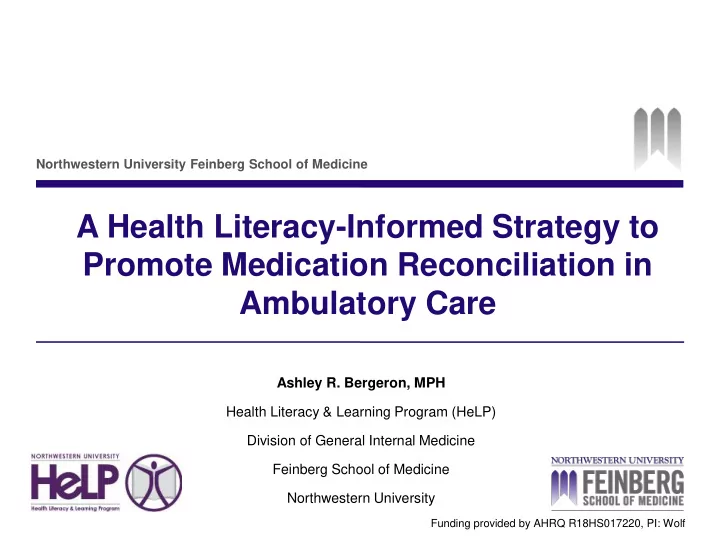

Northwestern University Feinberg School of Medicine A Health Literacy-Informed Strategy to Promote Medication Reconciliation in Ambulatory Care Ashley R. Bergeron, MPH Health Literacy & Learning Program (HeLP) Division of General Internal Medicine Feinberg School of Medicine Northwestern University Funding provided by AHRQ R18HS017220, PI: Wolf
Background • Discrepancies are common; self-reported medication lists and medications in a patients’ medical chart are often not the same 1 – This is a patient safety concern • In our clinic, 54.3% of patients had at least 1 discrepancy • Link between low health literacy and poor medication reconciliation in ambulatory care settings 2 1 Persell et al. Am J Med 2010, 2 Persell et al. JGIM 2007
Purpose of study To develop and test a health literacy-informed electronic health record (EHR) strategy to: Promote better patient-provider communication about medicines Reduce the number of discrepancies in EHR medication lists
Methods • One academic general internal medicine clinic in Chicago, IL • 144 patients recruited • Physician-randomized trial (intervention vs. usual care) • After-visit in-person interview • Medical chart review 2 and 6 weeks post in-person interview
The Intervention • Intervention received medication reconciliation tool (MRT) upon check-in • The MRT explained how to update the list and notate any concerns • This MRT was then given to the physician to prompt medication reconciliation
7
Types of discrepancies 1) Omission = taking a medication not on list 2) Commission =no longer taking a listed medication
Results • Mean age 60.5 years old • 42% Black, 44% White, 14% Other • Patients were taking: Mean = 8.2 Rx medications (SD 3.3) Mean = 2.8 OTC medications (SD 1.9) 9
Results
Results • In multivariable analyses, discrepancies that were less likely to be reconciled were: – Medicines prescribed by other physicians – OTC – Commissions 11
Conclusions • The MRT may be an efficient and sustainable means of promoting reconciliation and education • However, effectiveness was limited • Reconciliation usually at 6 weeks and not 2 weeks • Mostly for Rx medications • Patients still left the encounter with an after-visit summary that was not always correct
Limitations • Physicians and clinic staff were not asked to change their routine • Automated activities were supposed to prompt review of medications • Results are not generalizable to populations outside of this clinic 13
Post-trial feedback • Results were shared with clinic staff in study • Root causes of medicines that were not reconciled explored: • Not enough time during encounter • Not required to fix medication list • Non-prescriber 14
Next Steps • Future studies should pair the MRT with a counseling (nurse, pharmacist?) encounter to encourage thorough medication review • More robust means are needed to promote timely medication reconciliation at the same visit
Thank you! Contact Information: Ashley R. Bergeron, MPH Data Analyst Health Literacy and Learning Program, Division of General Internal Medicine Northwestern University Phone: (312) 503-5588 Email: a-bergeron@northwestern.edu
Recommend
More recommend